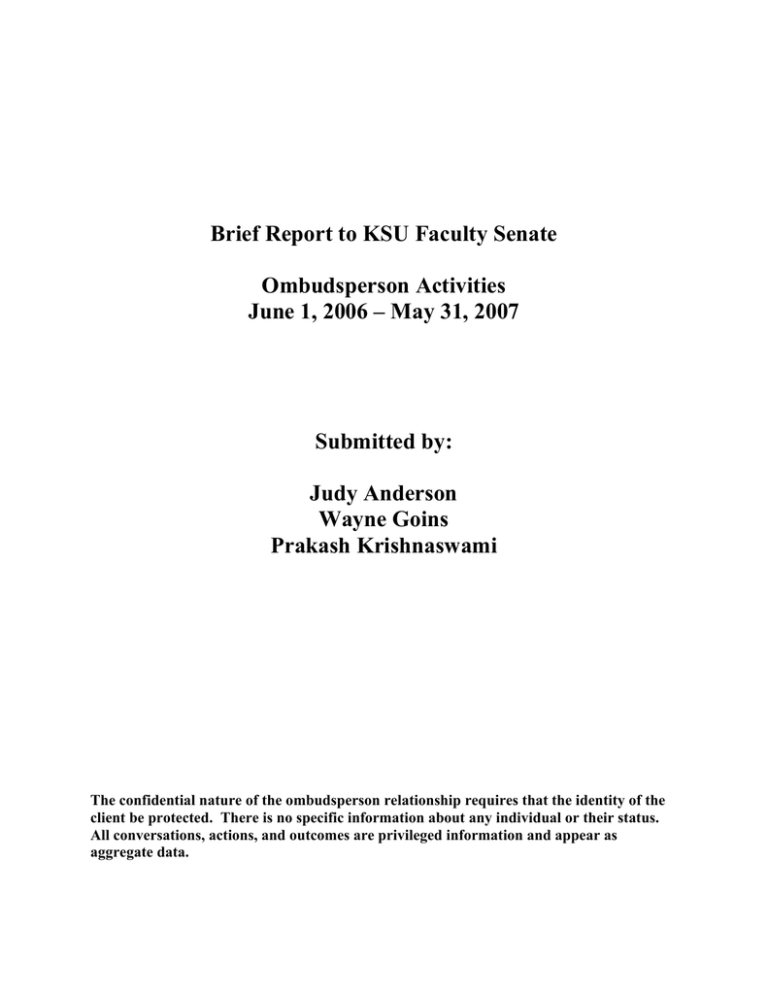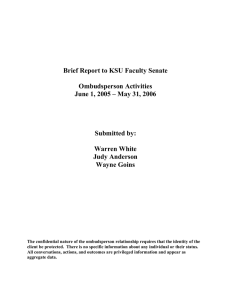
Brief Report to KSU Faculty Senate
Ombudsperson Activities
June 1, 2006 – May 31, 2007
Submitted by:
Judy Anderson
Wayne Goins
Prakash Krishnaswami
The confidential nature of the ombudsperson relationship requires that the identity of the
client be protected. There is no specific information about any individual or their status.
All conversations, actions, and outcomes are privileged information and appear as
aggregate data.
This report represents the ombudspersons activities from June 1, 2006 to May 31, 2007. We
have chosen to combine the activities of the three ombudspersons in order to provide a complete
picture of activity and protect the confidentiality of all parties. The confidential nature of the
ombudsperson relationship requires that the identity of the client be protected. There is no
specific information about any individual or their status. All conversations, actions, and
outcomes are privileged information and appear as aggregate data.
Summary:
We saw 41 cases for 153 hours:
Ombudsperson # Cases % Hours
JA
27
66
91
WG
10
24
23
PK
4
10
39
Total
41
100 153
%
59
15
26
100
Of the 41cases:
Men
Women
Minorities
Groups
21 (51%)
20 (49%)
7 (17%)
0
Graduate Students
Unclassified Professionals
Faculty (Tenured/Tenure Track)
Total
4 (10%)
22 (54%)
15 (36%)
41
Nature of complaints (44 complaints in 11 categories):
Workplace Climate
Promotion and Tenure
Compensation
Contract/Termination
Discrimination
Sexual Harassment
8 (18.2%)
6 (13.6%)
1 (2.3%)
9 (20.4%)
1 (2.3%)
1 (2.3%)
Performance Evaluation
Work Load
Appointment
Inquiry
Other
7 (15.9%)
0 (0%)
1 (2.3%)
4 (9.1%)
6 (13.6%)
Three cases were referred to Rusty Andrews, Human Systems Consultant, and no cases were
referred to mediation. All cases came from six colleges and two administrative units.
General Observations:
•
•
•
Resolutions can be extremely time consuming and elusive.
Of the 31 cases that were resolved, five individuals left the University; either their
contracts were not renewed or the individuals left because they were unhappy with their
situation.
Caseloads are heaviest between November and March.
2
Table 1. Caseload Activity by Issue, Time, and Resolution
Case
Issue
Time
Resolution
Grievance
1
2
3
4
5
6
7
8
9
10
11
12
13
14
15
16
17
18
19
20
21
22
23
24
25
26
27
28
29
30
31
32
33
34
35
36
37
38
39
40
41
Contract/Termination
Contract/Termination
Contract/Termination
Contract/Termination
Contract/Termination
Contract/Termination
Contract/Termination
Contract/Termination
Contract/Termination/Sexual Harassment
Workplace Climate
Workplace Climate
Workplace Climate
Workplace Climate
Workplace Climate
Workplace Climate
Workplace Climate
Workplace Climate/Discrimination
Performance Evaluation
Performance Evaluation
Performance Evaluation
Performance Evaluation
Performance Evaluation
Performance Evaluation
Performance Evaluation/Promotion and Tenure
Promotion and Tenure
Promotion and Tenure
Promotion and Tenure
Promotion and Tenure
Promotion and Tenure
Appointment
Compensation
Inquiry
Inquiry
Inquiry
Inquiry
Other
Other
Other
Other
Other
Other
30.00
3.00
2.00
1.50
1.25
.75
.50
.50
2.00
12.0
5.25
2.75
2.00
1.75
1.00
.25
1.00
19.75
4.75
4.00
4.00
3.25
.50
4.00
3.00
3.00
2.00
2.00
1.00
5.75
1.75
.25
.25
.25
.25
13.00
6.75
2.00
1.50
1.25
1.25
Total
153.00
3
Pending
Resolved
X
X
X
X
X
X
X
X
X
X
Unknown
X
X
X
X
X
X
X
X
X
X
X
X
X
X
X
X
X
X
X
X
X
X
X
X
X
X
X
X
X
X
X
4
(9.8%)
31
(75.6%)
6
(14.6%)


